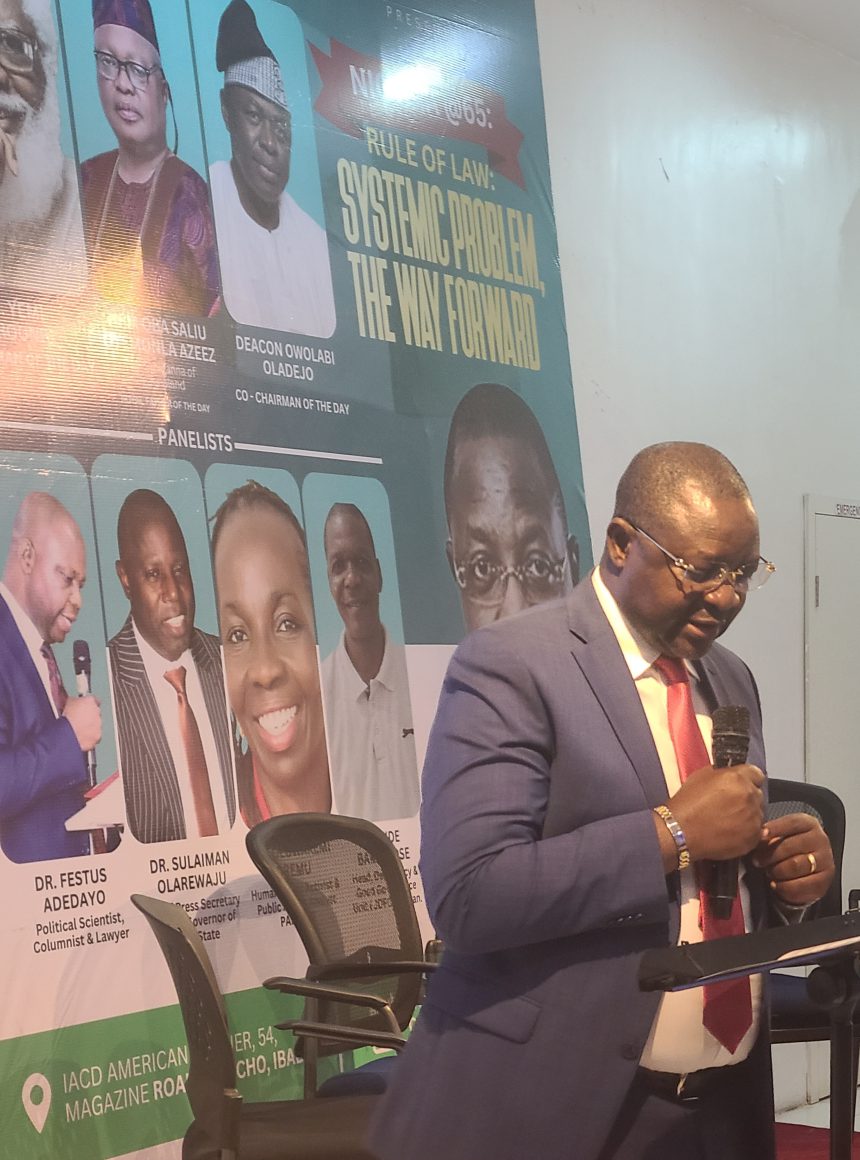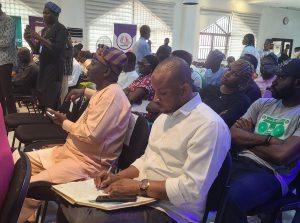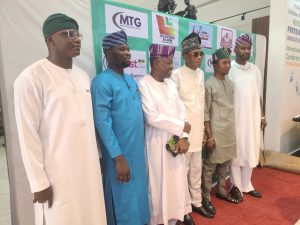At a national summit in Ibadan, presidential aide Sunday Dare declared that Nigeria’s rule of law is “the foundation of state legitimacy and the soul of governance,” warning that selective application and weak enforcement of laws are tearing at the country’s moral and institutional fabric.
Speaking as keynote speaker at the Media Transformative Group (MTG) Summit for Nigeria @65, held at the IACD Centre, American Corner, Jericho, Ibadan, Dare said that while Nigeria is not short of laws, the real crisis lies in their failure to deter wrongdoing, punish the powerful, and inspire citizens’ trust in justice.
He described the nation’s legal challenge as systemic and structural, cutting across outdated laws, slow judicial processes, overstretched law enforcement, and a deteriorating culture of civic responsibility. “Our problem is not the absence of laws,” he said. “It is the failure of laws to retire wrongdoing and reward accountability.”
Dare lamented that Nigeria still operates under colonial-era legal codes—the Penal Code in the North and the Criminal Code in the South—both designed for a pre-industrial society of the early 20th century. These outdated laws, he said, impose fines as low as ₦500 for offenses that no longer serve as deterrents. “Our legal system cannot deter crime when the law itself is obsolete,” he warned.
He also condemned the sluggish pace of Nigeria’s judiciary, where cases drag on for years despite reforms introduced through the Administration of Criminal Justice Act (ACJA) 2015. While the Act aimed to modernize criminal procedure, he noted that many states have failed to domesticate it, and those that have often neglect its spirit. “Justice delayed remains justice denied,” Dare stressed.
Turning to the issue of security and enforcement, the presidential aide said Nigeria’s police system is dangerously overstretched, with only about 420,000 officers serving a population of over 200 million — far below the UN’s recommended ratio. “The average Nigerian policeman faces 21st-century crimes using 20th-century tools in 19th-century conditions,” he said. The result, he explained, is a collapse of deterrence where “the fear of the law has been replaced by the confidence of impunity.”
Dare then shifted attention to the media’s role as the conscience of democracy, saying it must rise to its responsibility as “the guardian of accountability.” He praised journalists for their role in exposing corruption and misgovernance but warned against unprofessionalism and misinformation. “The media can amplify justice when ethical, or suffocate it when compromised,” he said.
He urged Nigerian journalists to go beyond routine reporting by educating and interrogating systemic weaknesses in governance and justice. “In an age of disinformation, ethical journalism is not just a professional duty; it is a patriotic act,” he noted.
Proposing a roadmap for reform, Dare outlined five key solutions to strengthen the rule of law. First, he called for legal modernization, including a full overhaul of the Penal and Criminal Codes to reflect modern crimes such as cybercrime, financial fraud, environmental offenses, and gender-based violence. He said the Nigerian Law Reform Commission (NLRC) must be strengthened with resources and independence to ensure continuous legislative renewal.
Second, he emphasized full implementation of the ACJA 2015 in all states, backed by investment in digital justice systems like e-filing, case tracking, and virtual hearings. Third, he urged the professionalization of policing, including better recruitment, forensic capacity, welfare reform, and the use of modern technology. Fourth, he called for judicial independence and accountability, free from political interference but rooted in transparency and performance audits.
Fifth, Dare said Nigeria must embark on a civic and institutional reorientation, teaching citizens that the law is not an obstacle but a shield for all. “When the people see the law as a partner in justice rather than an enemy, compliance will rise naturally,” he said.
He commended the Bola Tinubu administration for taking early steps toward rebuilding institutional trust, citing reforms in fiscal discipline, civil service digitalization, and police modernization. He also highlighted the ongoing review of outdated laws by the Federal Ministry of Justice and the NLRC, and the government’s dialogue with the judiciary on improved welfare for judges.
Dare concluded with a call to action, urging the media, civil society, and citizens to monitor and sustain these reforms. “Our true national project is not just to grow GDP or build infrastructure,” he said, “but to build a culture of consequence—where the law means what it says, and says what it means.”
The Ibadan event, which also featured goodwill messages, a panel discussion, and the official launch of the Media Transformative Group (MTG), ended with a shared resolution to strengthen ethical journalism, civic awareness, and justice reform as Nigeria marks 65 years of nationhood.









